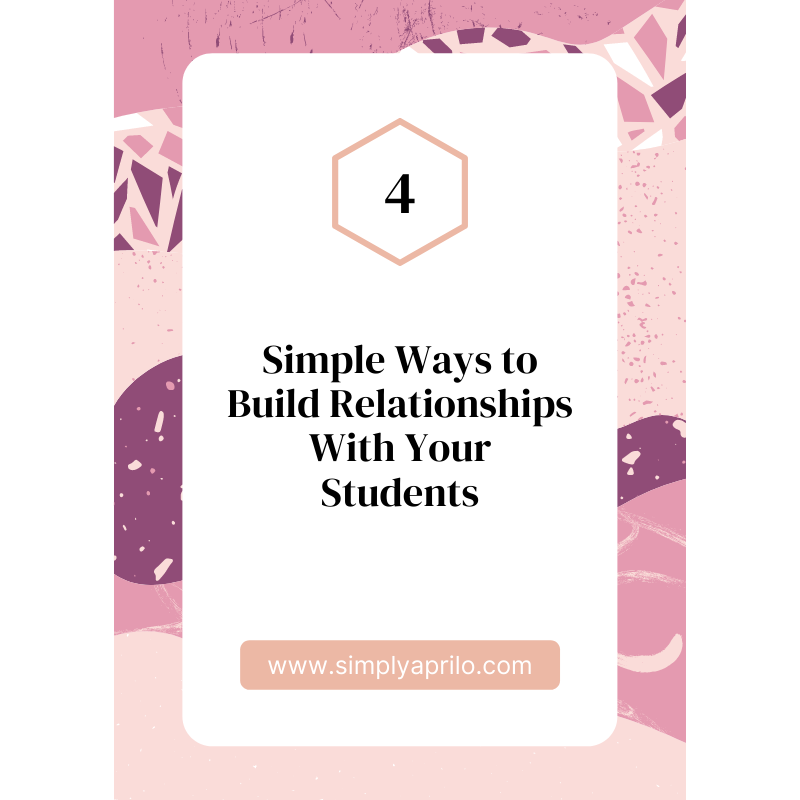Building Relationships With High School Students
The technique of building a relationship is a skill that I did not pick up on until my second or third year of teaching. I was able to form some connections, but I wasn’t intentional at first. My goal was for my students to be successful on their state-mandated exams, which isn’t a bad goal. But if I had been more open, relaxed, and allowed my student to do the same, I could have made a bigger impact.
Now I make time each day to get to know my students.
Teachers use numerous strategies to connect with their students because we know the importance of student-teacher relationships. Sometimes it’s a quick greeting at the door as they walk in. Or maybe it’s a special handshake.
Students, like adults, need a connection with others. A good student-teacher rapport encourages good behavior, keeps them engaged in learning, and gives them a sense of belonging. It is a critical component of their success.
4 Simple Ways to Build Relationships With Your Students
Why is building relationships with students important?
Building relationships with students is similar to building a relationship with another adult, in that it takes time and effort. The positive connection can lead to better classroom routines, confidence, and an increase in academic achievement.
Quote from Rita Pierson’s Ted Talk, “Kids don’t learn from people they don’t like.”
How to build positive relationships with your students
There are various ways we can build relationships with our students. The following are techniques I use in my classroom.
Find a shared interest
The best way I find common interests is through journals. Every day my students get a prompt that asks for their opinion or their experience on a topic. The topic varies and isn’t always about academics. They write about numerous things, such as family, friendships, and goals.
Some journal prompt examples are:
What do success and failure look like in the classroom? Is it something that you can easily point out?
If you won the lottery for a million dollars, what would you do with the money?
Tell me about a time that you made a decision and immediately regretted it.
If you run out of ideas, the New York Times has over 1000 writing prompts for students.
During the discussions, they are sharing parts of their life with me, and I’m able to do the same. This activity only takes 5-10 minutes. If you can’t spare that much time every day, then try doing this once or twice a week. You will learn so much about your students.
Attend extracurricular activities
Students love seeing their teachers at sporting events, plays, and other competitions. This is where you can see some of your students shine. You will gain their respect by taking the time to be with them. The result is a better connection with students and that can pay off with a more respectful relationship in the classroom as well.
Have a sense of humor
Throw away the old saying that you shouldn’t smile until December. Students need to see you laugh and that you are capable of having fun. Humor can go a long way toward tearing down walls and cohesion.
Plan for some light-hearted laughter by adding some funny material in the lesson, such as memes, cartoons, or games. However, keep it relevant to what you’re teaching to ensure that your students stay on task.
One on One Student Conference
A student conference is typically when you discuss their performance or behavior. During that time, I check their grades and I try to see how the student is doing in general. This is an opportunity for them to talk and open up about what’s going on. This is a time for them to lead the conversation and I’m there to support and listen.
Keep these ideas in mind when you start the school year. The connections you make with your students will help with classroom management and classroom procedures.
If you like this post, I would love for you to join my collaborative and supportive Facebook group for beginner teachers.
By joining this community you will gain:
Access to a closed community group in which you can ask questions, collaborate, and share sensitive information in confidence.
Support and encouragement
Teacher hacks to make your life easier.

